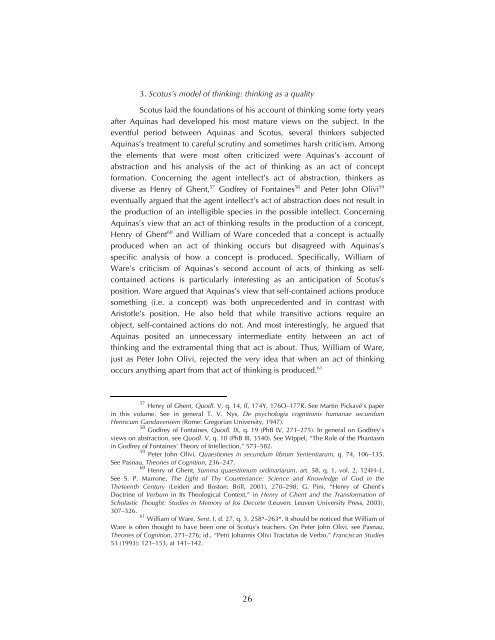Two Models of Thinking - Fordham University Faculty
Two Models of Thinking - Fordham University Faculty
Two Models of Thinking - Fordham University Faculty
You also want an ePaper? Increase the reach of your titles
YUMPU automatically turns print PDFs into web optimized ePapers that Google loves.
3. Scotus’s model <strong>of</strong> thinking: thinking as a qualityScotus laid the foundations <strong>of</strong> his account <strong>of</strong> thinking some forty yearsafter Aquinas had developed his most mature views on the subject. In theeventful period between Aquinas and Scotus, several thinkers subjectedAquinas’s treatment to careful scrutiny and sometimes harsh criticism. Amongthe elements that were most <strong>of</strong>ten criticized were Aquinas’s account <strong>of</strong>abstraction and his analysis <strong>of</strong> the act <strong>of</strong> thinking as an act <strong>of</strong> conceptformation. Concerning the agent intellect’s act <strong>of</strong> abstraction, thinkers asdiverse as Henry <strong>of</strong> Ghent, 57 Godfrey <strong>of</strong> Fontaines 58 and Peter John Olivi 59eventually argued that the agent intellect’s act <strong>of</strong> abstraction does not result inthe production <strong>of</strong> an intelligible species in the possible intellect. ConcerningAquinas’s view that an act <strong>of</strong> thinking results in the production <strong>of</strong> a concept,Henry <strong>of</strong> Ghent 60 and William <strong>of</strong> Ware conceded that a concept is actuallyproduced when an act <strong>of</strong> thinking occurs but disagreed with Aquinas’sspecific analysis <strong>of</strong> how a concept is produced. Specifically, William <strong>of</strong>Ware’s criticism <strong>of</strong> Aquinas’s second account <strong>of</strong> acts <strong>of</strong> thinking as selfcontainedactions is particularly interesting as an anticipation <strong>of</strong> Scotus’sposition. Ware argued that Aquinas’s view that self-contained actions producesomething (i.e. a concept) was both unprecedented and in contrast withAristotle’s position. He also held that while transitive actions require anobject, self-contained actions do not. And most interestingly, he argued thatAquinas posited an unnecessary intermediate entity between an act <strong>of</strong>thinking and the extramental thing that act is about. Thus, William <strong>of</strong> Ware,just as Peter John Olivi, rejected the very idea that when an act <strong>of</strong> thinkingoccurs anything apart from that act <strong>of</strong> thinking is produced. 6157 Henry <strong>of</strong> Ghent, Quodl. V, q. 14, ff, 174Y, 176O–177R. See Martin Pickavé’s paperin this volume. See in general T. V. Nys, De psychologia cognitionis humanae secundumHenricum Gandavensem (Rome: Gregorian <strong>University</strong>, 1947).58 Godfrey <strong>of</strong> Fontaines, Quodl. IX, q. 19 (PhB IV, 271–275). In general on Godfrey’sviews on abstraction, see Quodl. V, q. 10 (PhB III, 3540). See Wippel, “The Role <strong>of</strong> the Phantasmin Godfrey <strong>of</strong> Fontaines’ Theory <strong>of</strong> Intellection,” 573–582.59 Peter John Olivi, Quaestiones in secundum librum Sententiarum, q. 74, 106–135.See Pasnau, Theories <strong>of</strong> Cognition, 236–247.60 Henry <strong>of</strong> Ghent, Summa quaestionum ordinariarum, art. 58, q. 1, vol. 2, 124H–L.See S. P. Marrone, The Light <strong>of</strong> Thy Countenance: Science and Knowledge <strong>of</strong> God in theThirteenth Century (Leiden and Boston: Brill, 2001), 270–298; G. Pini, “Henry <strong>of</strong> Ghent’sDoctrine <strong>of</strong> Verbum in Its Theological Context,” in Henry <strong>of</strong> Ghent and the Transformation <strong>of</strong>Scholastic Thought: Studies in Memory <strong>of</strong> Jos Decorte (Leuven: Leuven <strong>University</strong> Press, 2003),307–326. 61 William <strong>of</strong> Ware, Sent. I, d. 27, q. 3, 258*–263*. It should be noticed that William <strong>of</strong>Ware is <strong>of</strong>ten thought to have been one <strong>of</strong> Scotus’s teachers. On Peter John Olivi, see Pasnau,Theories <strong>of</strong> Cognition, 271–276; id., “Petri Johannis Olivi Tractatus de Verbo,” Franciscan Studies53 (1993): 121–153, at 141–142.26
















